一般疑问句和特殊疑问句完整版
英语一般问句和特殊问句的构成
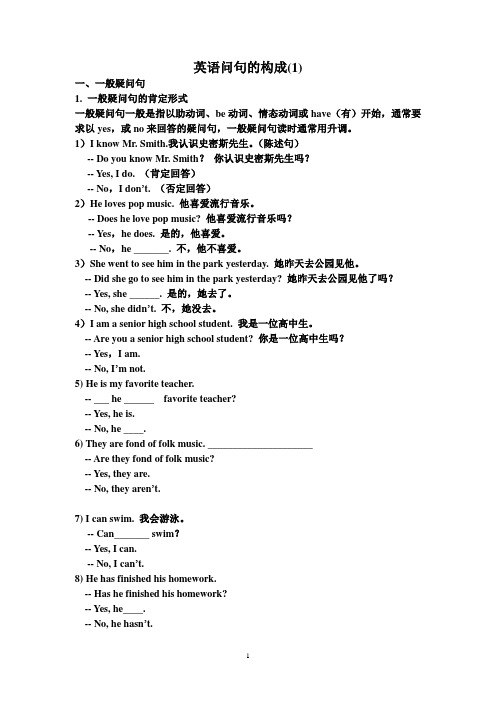
英语问句的构成(1)一、一般疑问句1. 一般疑问句的肯定形式一般疑问句一般是指以助动词、be动词、情态动词或have(有)开始,通常要求以yes,或no来回答的疑问句,一般疑问句读时通常用升调。
1)I know Mr. Smith.我认识史密斯先生。
(陈述句)-- Do you know Mr. Smith?你认识史密斯先生吗?-- Yes, I do. (肯定回答)-- No,I don’t. (否定回答)2)He loves pop music. 他喜爱流行音乐。
-- Does he love pop music? 他喜爱流行音乐吗?-- Yes,he does. 是的,他喜爱。
-- No,he _______. 不,他不喜爱。
3)She went to see him in the park yesterday. 她昨天去公园见他。
-- Did she go to see him in the park yesterday? 她昨天去公园见他了吗?-- Yes, she ______. 是的,她去了。
-- No, she didn’t. 不,她没去。
4)I am a senior high school student. 我是一位高中生。
-- Are you a senior high school student? 你是一位高中生吗?-- Yes,I am.-- No, I’m not.5) He is my favorite teacher.-- ___ he ______ favorite teacher?-- Yes, he is.-- No, he ____.6) They are fond of folk music. _____________________-- Are they fond of folk music?-- Yes, they are.-- No, they aren’t.7) I can swim. 我会游泳。
一般疑问句与特殊疑问句

一般疑问句与特殊疑问句01 一般疑问句一般疑问句通常需要用yes 或no 来回答,所以又叫做“是非疑问句”。
在读这种句子时要用升调。
一般疑问句主要有以下几种类型:一、“be + 主语+ 表语”结构— Are you sleepy ? 你困了吗?— Yes, I am . 是的,我困了。
二、“情态动词+ 主语言+ 行为动词(或be)”结构— May/Can I use the telephone? 我能用这部电话吗?— Yes, you can. 是的,可以。
三、“助动词(do, does, did)+ 主语+ 行为动词”结构— Do you like swimming in summer? 你喜欢夏天游泳吗?— No, I don`t . 不,我不喜欢。
四、难点提示:回答否定性一般疑问句时,要在Yes 后面用肯定结构,表示肯定;在No 后面用否定结构,表示否定。
注意在说法上正好与汉语习惯相反。
诀窍是在回答的时候,只要把它当成没有加否定形式的普通一般疑问句看待就可以了。
注意下面例句的回答和它的意思。
— Is he not your elder brother? 他不是你的哥哥吗?—Yes, he is . 不,他是(我的哥哥)。
—No, he is not. 是的,他不是(我的哥哥)。
— Isn`t she very clever? 她难道不是很聪明吗?— Yes, she is. 不,她很聪明。
— No, she is not . 是,她不聪明。
02 特殊疑问句一、特殊疑问句是用来提出来特定问题的疑问句,要求听到问题的人针对特定情况来做具体的回答,不能像一般疑问句一样简单地用Yes 或No 来回答,特殊疑问句要用降调来读。
二、特殊疑问句的结构:特殊疑问词+ 一般疑问句Who do English homework in the evening?谁晚上做英语家庭作业?What do you do in the evening?你晚上做什么?What homework do you do in the evening?你晚上做什么家庭作业?When do you do English homework?你什么时候做英语家庭作业?三、注意:对人提问时who“谁”对所属(谁的)提问用whose“谁的”对哪一个提问用which“哪一个”对时间提问用when“什么时候”或what time“几点”对物体提问用what“什么”对地点提问用where“哪里”对原因提问用why“为什么”对方式提问用how“怎么样”对数量提问用how many“多少”(用于可数名词复数)或how much“多少”(用于不可数名词)四、难点提示1、以why开头的特殊疑问句否定形式常用于表示建议、请求等。
(完整版)英语一般疑问句和特殊疑问句的讲解及练习

一般疑问句用be动词(am /is主语+其他成分,+主语+提问的词.否定:No,+主语+提问的词+not.Are you from Japan﹖Yes ,I am./ No, I'm not.Is her sister doing her homework now﹖Yes, she is./ No, she isn't.Does he work in a bank﹖Yes, he does./ No, he doesn't.Can you speak French﹖Yes, I can./ No, I can't.一: 般疑问句还有下列特点:1、以be动词、助动词或情态动词开头;例:Is your father a teacher? Does Catherine like animals? Can Jenny speak French?二: 如何将陈述句变成一般疑问句?1.如句中有be 动词(am、is、are、was、were can、may、must …)或助动词(do、does、did、have、had(完成时中))时,可直接将它们提到句首,句末打上问号即可。
主语为第一人称,应将其改为第二人称。
例:It was rainy yesterday.→Was it rainy yesterday?Tom's father can play the piano.→Can Tom's father play the piano?I have finished my homework.→Have you finished your homework?2.如果句中没有be动词、助动词或情态动词,则根据谓语动词的形式借助do的相应形式放在句首。
具体方法是:如果谓语动词是原形,则借do;如果谓语动词是一般现在时第三人称单数形式,则借does;如果谓语动词是过去式,则借did. 需要注意的是,借does或did后,原句的谓语动词要变回原形。
一般疑问句、特殊疑问句、选择疑问句、反义疑问句地详细用法
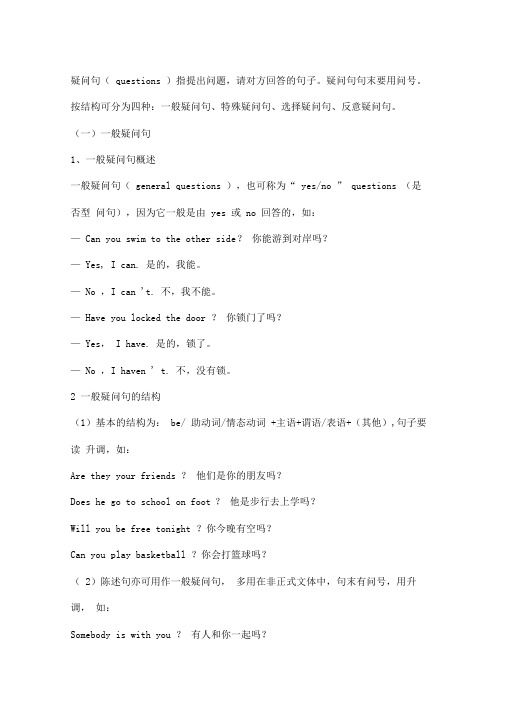
疑问句( questions )指提出问题,请对方回答的句子。
疑问句句末要用问号。
按结构可分为四种:一般疑问句、特殊疑问句、选择疑问句、反意疑问句。
(一)一般疑问句1、一般疑问句概述一般疑问句( general questions ),也可称为“ yes/no ” questions (是否型问句),因为它一般是由 yes 或 no 回答的,如:— Can you swim to the other side ?你能游到对岸吗?— Yes, I can. 是的,我能。
— No ,I can 't. 不,我不能。
— Have you locked the door ?你锁门了吗?— Yes, I have. 是的,锁了。
— No ,I haven ' t. 不,没有锁。
2 一般疑问句的结构(1)基本的结构为: be/ 助动词/情态动词 +主语+谓语/表语+(其他),句子要读升调,如:Are they your friends ?他们是你的朋友吗?Does he go to school on foot ?他是步行去上学吗?Will you be free tonight ?你今晚有空吗?Can you play basketball ?你会打篮球吗?( 2)陈述句亦可用作一般疑问句,多用在非正式文体中,句末有问号,用升调,如:Somebody is with you ?有人和你一起吗?He didn ' t finish the work ?他没有做完活吗?You are fresh from America , I suppose ?我猜,你刚从美国回来吧?3、一般疑问句的答语( 1)一般疑问句一般由 yes 或 no 来回答,如:— Are you tired ?你累了吗?— Yes,I am. 是的 ,累了。
— No, I ' m not. 不,不累。
— Does she do the cleaning ?她扫除了吗?— Yes , she does. 是的,她打扫了。
一般和特殊疑问句

• when
• 为什么
• why
• 如何
• how
特殊疑问词短语
1. what time:
• 问时间点
2. what colour
• 什么颜色)
3. what weather
• 什么天气
4. 什么学科
• what subject
5. 多少
• How many/much
6. 多长
• How long:
0
●动词的及物性
●主谓一致
出现严重中的语法和选词错误, 导致误解或不能理解所表达的信 息,比如: ●疑问词错误 ●结构不完整,而且意义不连贯
不影响理解所表达的信息 导致不能理解所表达的信息
0.5 基本按照要求传递了信息
信0 息
不能按照要求传递信息
1.5 按照要求传递了信息
基本按照要求传递信息(漏
1
了一、两点次要信息、或添
Who should be responsible for this matter?
2.谁想和我一起去购物? Who wants to go shopping with me?
3. 那个女孩是谁?
Who is that girl?
对物主代词和名词所有格提问用whose。“谁的
1.这是谁的英语书? Whose English book is this?
加了无关信息)
0
不能按照要求传递信息
情景介绍
• 角色:你是女士的同事
• 任务:(1)和女士谈论生活和明晚去参加 音乐会的相关事情
•
(2)根据谈话内容回答问题
7:18
明天晚上的音乐会你会想去吗?
Would you want to go to the concert tomorrow? 我们在哪儿见面?
一般疑问句和特殊疑问句

大观语法沙龙苑CRAZY ENGLISH! 一般疑$句!特殊疑问%北京杨良疑问句即用于提出问题的句子。
在英语中,一般 疑问句和特殊疑问句是最常见的两种疑问句,现将其 概念、构成及答语等简介如下:一 ^一般疑问句能用ye s/no 回答的问句叫一般疑问句。
一般疑问句往往读升调,译成汉语时常含有“……吗?”之意。
1. 一般疑问句的构成(1) 含连系动词be (am ,is ,are ,was ,were )的一般疑问句,构成形式:Be +主语+表语+其他成分?例如:①Is it a map of China?这是一幅中国地图吗?② Were they here only a few minutes ago?只是几分钟前他们在这里了吗?(2)含情态动词的一般疑问句,构成形式:情态动 词3主语3实义动词3其他成分?例如:① Can you sing English songs?你会唱英语歌吗?② May I have your name?我能知道你的名字吗?(3) 含实义动词的一般疑问句,构成形式:助动词 (Do / Does / Did / Will / Shall / Have / Has / Had /A m /Is /A re /W a s /W e re )+主语+实义动词的适 当形式+其他成分?例如:① Does she live in Beijing?她住在北京吗?② Do you like listening to English songs ?你喜英语歌吗?③ Have they found the missing child yet?他们]找到失踪的孩子了吗?(4) 少数□语化的一般疑问句。
如问一个与前文 相同的问句时,可省略成% A nd you?”或“What / How about...?” 等。
2. —般疑问句的应答肯定的答句形式:Yes ,主语+连系动词(情态动词、助动词)+其他成分;否定的答句形式:No,主语+ 连系动词(情态动词、助动词)+ not(not 常与前边的词 缩写)+其他成分。
一般疑问句和特殊疑问句
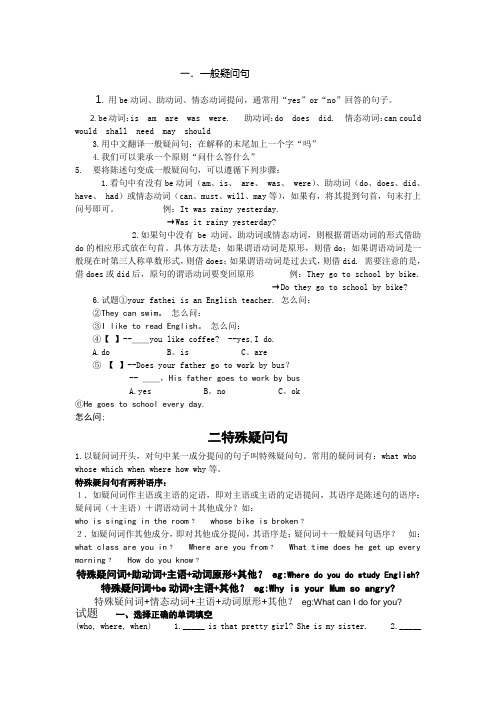
一.一般疑问句1.用be动词、助动词、情态动词提问,通常用“yes”or“no”回答的句子。
2. be动词:is am are was were. 助动词:do does did. 情态动词:can could would shall need may should3.用中文翻译一般疑问句;在解释的末尾加上一个字“吗”4.我们可以秉承一个原则“问什么答什么”5.要将陈述句变成一般疑问句,可以遵循下列步骤:1.看句中有没有be动词(am、is、 are、 was、 were)、助动词(do、does、did、have、 had)或情态动词(can、must、will、may等),如果有,将其提到句首,句末打上问号即可。
例:It was rainy yesterday.→Was it rainy yesterday?2.如果句中没有be动词、助动词或情态动词,则根据谓语动词的形式借助do的相应形式放在句首。
具体方法是:如果谓语动词是原形,则借do;如果谓语动词是一般现在时第三人称单数形式,则借does;如果谓语动词是过去式,则借did. 需要注意的是,借does或did后,原句的谓语动词要变回原形例:They go to school by bike.→Do they go to school by bike?6.试题①your fathei is an English teacher. 怎么问:②They can swim。
怎么问:③I like to read English。
怎么问:④【】--__you like coffee? --yes,I do.A.do B。
is C。
are⑤【】--Does your father go to work by bus?-- __,His father goes to work by busA.yes B。
no C。
ok⑥He goes to school every day.怎么问;二特殊疑问句1.以疑问词开头,对句中某一成分提问的句子叫特殊疑问句。
一般疑问句和特殊疑问句 (附练习题及答案

How do you go home?
On foot.
how old
多大
问年龄
How old is he?
6 years old.
how many
多少
问数量
How many books are there in the bookcase?
There are 10.
how much
多少
问价钱
How much is the book?
9. Mrs. Li and Kitty watch television at night.
Do Mrs. Li and Kitty watch television at night? Yes, they do. / No, they don’t.
10. I can finish my homework by myself.
中小学英语一般疑问句和特殊疑问句详解(附练习题及答案)
一、一般疑问句
1、定义:用Yes或No作答的疑问句叫一般疑问句。
2、特点:
1>以be动词am/is/are、助动词do/does、情态动词can/could/may、there be(即there is /are)开头;
例:Is your father a teacher?/ Does Tom like apples? /Can Jenny speak English? /Is there a book on the desk?
There is a book on the desk.→Is there a book on the desk?
2>如果句中没有be动词或情态动词,句首加do的相应形式(do、does、did),且原句的谓语动词要变回原形。
特殊疑问句和一般疑问句的用法
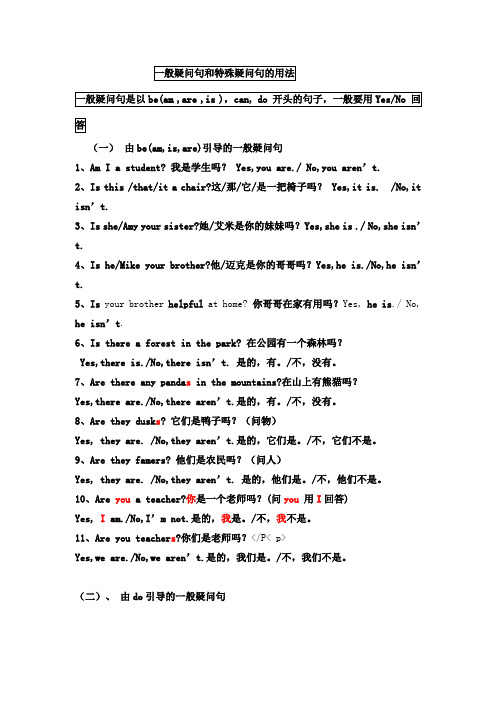
(一)由be(am,is,are)引导的一般疑问句1、Am I a student? 我是学生吗? Yes,you are./ No,you aren’t.2、Is this /that/it a chair?这/那/它/是一把椅子吗? Yes,it is. /No,it isn’t.3、Is she/Amy your sister?她/艾米是你的妹妹吗?Yes,she is ./ No,she isn’t.4、Is he/Mike your brother?他/迈克是你的哥哥吗?Yes,he is./No,he isn’t.5、Is your brother helpful at home? 你哥哥在家有用吗?Yes, he is./ No, he isn’t.6、Is there a forest in the park? 在公园有一个森林吗?Yes,there is./No,there isn’t. 是的,有。
/不,没有。
7、Are there any panda s in the mountains?在山上有熊猫吗?Yes,there are./No,there aren’t.是的,有。
/不,没有。
8、Are they dusk s? 它们是鸭子吗?(问物)Yes, they are. /No,they aren’t.是的,它们是。
/不,它们不是。
9、Are they famers? 他们是农民吗?(问人)Yes, they are. /No,they aren’t. 是的,他们是。
/不,他们不是。
10、Are you a teacher?你是一个老师吗?(问you 用I回答)Yes, I am./No,I’m not.是的,我是。
/不,我不是。
11、Are you teacher s?你们是老师吗?</P< p>Yes,we are./No,we aren’t.是的,我们是。
小学英语一般疑问句和特殊疑问句

Whose book is this?(单数)
It’s Ann’s.
表示“谁的”
Whose books are these?(复数)
They’re Ann’s.
How much
How much is the book?
It’s ten yuan.
表示“多少钱”
How many
How many books are there?
There are five.
表示“多少数量”
总结:①单数用is复数用are,单数问题单数答,复数问题复数答;
②whose表示“谁的”,回答要有“的”,How much回答有“yuan”
③看到“Is ......或者Are......”开头的问句,回答要有Yes或No。
No, I can’t.
特殊疑问句:对句中的某一成分提问,不用yes和no来回答
疑问词
问
答
用法
what
at is this?(单数)
It’s a ruler.
表示“什么”
What are these?(复数)
They are rulers.
who
Who’s that?
That’s Ann.
表示“谁”
Yes, they are.
No, they aren’t.
Do开头
Do you like panda?
Yes, I do.
No, I don’t.
Does开头
Does he like cat?
Yes, he does.
No, he doesn’t.
Can开头
Can you jump?
Yes, I can.
一般疑问句和特殊疑问句等句型联系

一般疑问句和特殊疑问句一、一般疑问句be动词(am, is are)肯定:Yes, 主语+引导词引导词can/will/should等情态动词答语do/does/did助动词否认:No, 主语+引导词+not二、特殊疑问句〔即由特殊疑问词引导的疑问句〕特殊疑问词有:when, where, who, what, whose, why, howbe动词(am, is are)特殊疑问词+ can/will/should等情态动词+ 主语+ 谓语+ 其他do/does/did助动词改写否认句型be动词+ notcan/will/should等情态动词+ not主语+ do/does/did + not + 谓语动词感慨句的表述What + a/an + 形容词+ 名词例:What an interesting film!How + 形容词+ 主语+ 谓语例:How interesting the film is!补充知识点动词原形如:buy(买)1、be going to + 地点如:the park打算... 时间如:on Monday2、want to + 动词原形表示“想要...〞3、在......转弯用介词“at〞, 如turn left at.../turn right at4、like + V-ing, 如:He likes playing basketball.5、by + 交通工具,表示交通方式。
6、go to + 地点,表示“去...〞; get to + 地点,表示“到...〞7、next to 挨着;near 在...附近; in front of... 在...前面;behind... 在...后面8、be far from... 离...远的句型转换练习题一、改成一般疑问句1、He is a student.2、She can dance.3、You like apples.二、改成否认句1、He is a student.2、She can dance.3、You like apples.三、对划线局部提问1、He goes to school by bus.2、He is a coach.3、The hospital is near the bookstore.4、I am going to the cinema tomorrow.四、改成感慨句1、The cinema is great.2、The girl is beautiful.补充实义动词动词单三形式将括号里动词的适当形式填入横线上。
一般疑问句和特殊疑问句
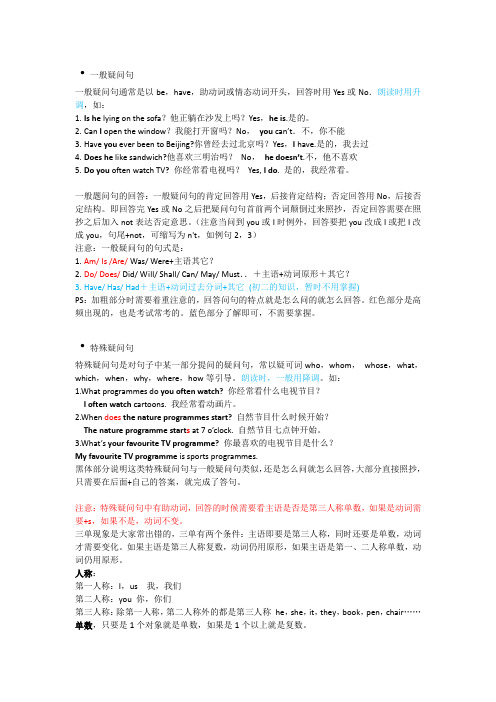
·一般疑问句一般疑问句通常是以be,have,助动词或情态动词开头,回答时用Yes或No.朗读时用升调,如:1.Is he lying on the sofa?他正躺在沙发上吗?Yes,he is.是的。
2.Can I open the window?我能打开窗吗?No,you can’t.不,你不能3.Have you ever been to Beijing?你曾经去过北京吗?Yes,I have.是的,我去过4.Does he like sandwich?他喜欢三明治吗?No,he doesn’t.不,他不喜欢5.Do you often watch TV? 你经常看电视吗?Yes, I do. 是的,我经常看。
一般题问句的回答:一般疑问句的肯定回答用Yes,后接肯定结构;否定回答用No,后接否定结构。
即回答完Yes或No之后把疑问句句首前两个词颠倒过来照抄,否定回答需要在照抄之后加入not表达否定意思。
(注意当问到you或I时例外,回答要把you改成I或把I改成you,句尾+not,可缩写为n't,如例句2,3)注意:一般疑问句的句式是:1.Am/ Is /Are/ Was/ Were+主语其它?2.Do/ Does/ Did/ Will/ Shall/ Can/ May/ Must..+主语+动词原形+其它?3.Have/ Has/ Had+主语+动词过去分词+其它(初二的知识,暂时不用掌握)PS:加粗部分时需要着重注意的,回答问句的特点就是怎么问的就怎么回答。
红色部分是高频出现的,也是考试常考的。
蓝色部分了解即可,不需要掌握。
·特殊疑问句特殊疑问句是对句子中某一部分提问的疑问句,常以疑可词who,whom,whose,what,which,when,why,where,how等引导。
朗读时,一般用降调。
如:1.What programmes do you often watch? 你经常看什么电视节目?I often watch cartoons. 我经常看动画片。
一般疑问句和特殊疑问句

注意: 1.回答特殊疑问句时,不能用yes / no, 即问什么答什么,尤其是简略回答。如: Who is from Canada﹖ Helen (is).
Where's the restaurant﹖ Near the station.
Why do you like koalas﹖ Because they are cute.
判断哪些是一般疑问句
1.Is the boy under the tree hungry? 2.Where do you live? 3. Is there a big supermarket? 4. Do you want to have a model car? 5. Does she want a cup of coffee? 6. Can you speak English? 7.What are you going to do? 8.Are you going to have a picnic?
2.如果句中没有be动词、助动词或情态动词,则根据 谓语动词的形式借助do的相应形式放在句首。具体方 法是:如果谓语动词是原形,则借do;如果谓语动词 是一般现在时第三人称单数形式,则借does;如果谓 语动词是过去式,则借did. 需要注意的是,借does或 did后,原句的谓语动词要变回原形。 例:They go to school by bike.
特殊疑问句练习题 一、选择正确的单词填空
who, where, when,what time, what color, what day, what, why, whose, how much, how many , how often, how,which 1. A: ______ _______ is it? B: It is nine o’clock. 2. A: ______ _______ does your mother get up? B: My mother gets up at 6:30. 3. A: ______ _______ do you go to bed? B: I go bed at 10:00. 4. A: ______ _______is it? B: It is purple. 5. A: ______ _______ is the sky? B: The sky is blue. 6. A: ______ _______ is today? B: Today is Monday. 7. A: ______ _______ is tomorrow? B: Tomorrow is Tuesday. 8. A: ______ _______ was yesterday(昨天)? B: Yesterday was Sunday. 9. A: ______ are you doing? B: We are playing basketball. 10. A: ______ does your mother do? B: My mother is a policewoman. 11. A: ______ is on the table? B: The apple is on the table. 12._____ is that pretty girl? She is my sister. 13._____ are Jack and Tom? They are behind you. 14._____ do you go to school? I go to school from Monday to Friday. 15._____ are they? They are my parents.
一般疑问句和特殊疑问句(附练习题及答案

中小学英语一般疑问句和特殊疑问句详解 (附练习题及答案)一、一般疑问句1、定义: 用Yes或No作答的疑问句叫一般疑问句。
作答的疑问句叫一般疑问句。
2、特点:1> 以be动词am/is/are、助动词do/does、情态动词can/could/may、there be(即there is /are)开头;例:Is your father a teacher?/ Does Tom like apples? /Can Jenny speak English? /Is there a book on the desk?2> 往往读升调往往读升调3、陈述句变成一般疑问句的方法:1> 看陈述句中有没有be动词(am、is、are、was、were)或情态动词(can/could/may),如果有,将其提到句首,句末打上问号即可。
例: It is rainy now→Is it rainy now?Tom's father can play the piano.→ Can Tom's father play the piano?There is a book on the desk.→ Is there a book on the desk?2>如果句中没有be动词或情态动词,句首加do的相应形式(do、does、did),且原句的谓语动词要变回原形。
1. They go to school by bike. → Do they go to school by bike?2. Bill gets up at 6:30 every day. → Does bill gets up at 6:30 every day?3. The students saw a film yesterday. → Did the students see a film yesterday?则变问句时要变为第二人称。
一般疑问句及特殊疑问句
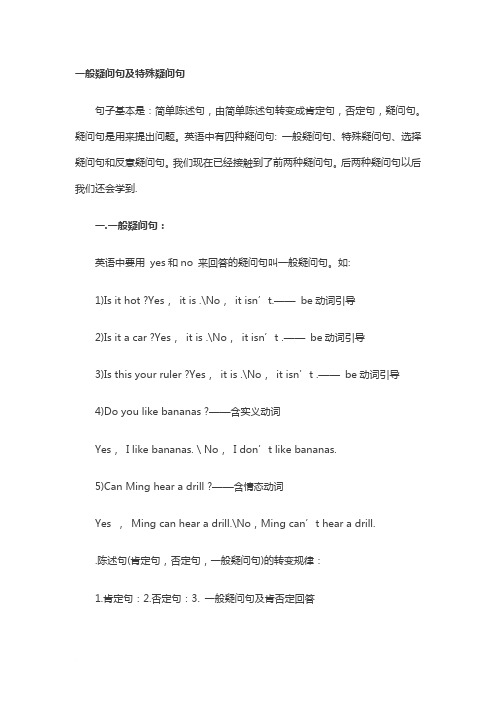
一般疑问句及特殊疑问句句子基本是:简单陈述句,由简单陈述句转变成肯定句,否定句,疑问句。
疑问句是用来提出问题。
英语中有四种疑问句: 一般疑问句、特殊疑问句、选择疑问句和反意疑问句。
我们现在已经接触到了前两种疑问句。
后两种疑问句以后我们还会学到.一.一般疑问句:英语中要用yes和no 来回答的疑问句叫一般疑问句。
如:1)Is it hot ?Yes,it is .\No,it isn’t.——be动词引导2)Is it a car ?Yes,it is .\No,it isn’t .——be动词引导3)Is this your ruler ?Yes,it is .\No,it isn’t .——be动词引导4)Do you like bananas ?——含实义动词Yes,I like bananas. \ No,I don’t like bananas.5)Can Ming hear a drill ?——含情态动词Yes ,Ming can hear a drill.\No,Ming can’t hear a drill..陈述句(肯定句,否定句,一般疑问句)的转变规律:1.肯定句:2.否定句:3. 一般疑问句及肯否定回答1) 主语+be动词+….1) 主语+be动词+not+….1)be动词+主语+…?Yes,主语+be动词./No,主语+be动词+not.I am a teacher. I amnot a teacher.Are you a teacher?--Yes,I am./ No,I am not.My mother is thin. My mother is not /isn’t thin.Is your mother thin?--Yes,she is./ No,she isn’t.They areinsects. They are not/aren’t insects.Are they insects?--Yes. they are./ No,they aren’t.2) 主语+情态动词can+…2) 主语+情态动词can+ not+….2)情态动词can+主语+…?Yes,主语+情态动词can/No,主语+情态动词can+ notHe can jump. He cannot/can’tjump.Can he jump?--Yes,he can./ No,he can’t.3)助动词do/does+主语+…. 动词原形+….动词原形?Yes,主语+助动词do/does.No,主语+助动词do/does+not.He likes to eat apples. He doesn’t like to eat apples. Does he like to eat apples?Yes,he does./ No,he doesn’t.二. 祈使句:表示请求、命令、建议或劝告等的句子叫祈使句,主语you 常省略。
(完整版)一般疑问句、特殊疑问句

陈述句含义:用于陈述事实和观点的句子。
陈述句包括肯定结构和否定结构。
This is a desk. (肯定结构)He can sing and dance. (肯定结构)He doesn't have a computer. (否定结构)There aren 't any pictures. (否定结构)肯定句变否定句:1. be 动词的否定式be:am ,is ,are,was were 构成否定式时,一律在后面加否定词not He is reading. →He is not reading. They are from China. →They are not from China.2. 情态动词的否定式情态动词:can, could, must , may, might, will, would ,shall,should ,need, ⋯⋯构成否定式时,一律在情态动词后面加否定词not I can swim. → I can not swim. You should arrive here on time.→You should not arrive here on time.3. 实意动词的否定句实意动词:即行为动词, 表示动作的动词。
它分为及物动词和不及物动词两种(及物动词是指后面要求有宾语的动词;不及物动词指后面不需要跟宾语的动词)构成否定式时,要借助助动词do, does, did ,在一般现在时中用do 或者does,在一般过去时中用did 。
结构为:主语+don't doesn't didn 't+动词原形+其它I like pop music. → I don ' t like pop music.She often swims. → She doesn't often swim. He handed in his homework.→He didn ' t hand in his homework.一般疑问句含义:一般疑问句是疑问句的一种。
一般疑问句与特殊疑问句

一般疑问句与特殊疑问句一般疑问句1. 概念能用yes / no(或相当于yes / no)回答的问句叫一般疑问句。
2. 含系动词be的一般疑问句的构成具体地说,就是当陈述句中有am /is / are时,可直接将它们提至主语前,但如遇第一人称,最好将其置换成第二人称。
如:I'm in Class 2, Grade 1. →Are you in Class 2, Grade 1? 你是在一年级二班吗?It's a map of China. →Is it a map of China? 这是一幅中国地图吗?3. 含情态动词的一般疑问句的构成一般疑问句面前人人平等:情态动词与am / is / are一样,也可直接将它们提至主语前,所以问题迎刃而解了。
如:I can spell it. →Can you spell it? 你会拼写它吗?4. 含实义动词的一般疑问句的构成含实义动词的一般疑问句的构成稍微有点讲究,要在句首加do;如逢主语为第三人称单数,谓语动词为一般现在时单数第三人称形式"v-(e)s"时,奉does为座上宾并要变回原形(如has→have,likes→like等);有时陈述句中的some还要变作any等。
如:She lives in Beijing. →Does she live in Beijing? 她住在北京吗?I like English. →Do you like English? 你喜欢英语吗?There are some book s on my desk.→Are there any books on your desk?5. 少数口语化的一般疑问句如问一个与前文相同的问句时,可省略成"And you?"或"What / How about...?"等;甚至只抓关键词,读作升调。
如:Your pen? 你的钢笔?6. 小插曲:一般疑问句的语调大部分的一般疑问句都应读作升调(↗),并落在最后一个单词身上。
一般疑问句_特殊疑问句
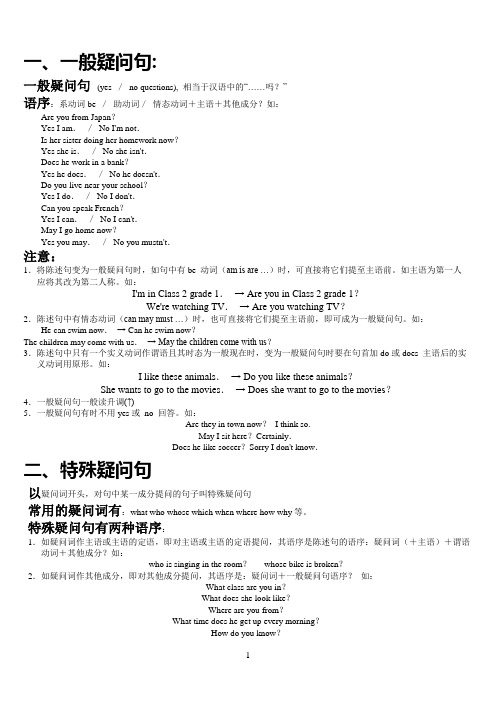
一、一般疑问句:一般疑问句(yes /no questions), 相当于汉语中的“……吗?”语序:系动词be /助动词/情态动词+主语+其他成分?如:Are you from Japan?Yes I am./No I'm not.Is her sister doing her homework now?Yes she is./No she isn't.Does he work in a bank?Yes he does./No he doesn't.Do you live near your school?Yes I do./No I don't.Can you speak French?Yes I can./No I can't.May I go home now?Yes you may./No you mustn't.注意:1.将陈述句变为一般疑问句时,如句中有be 动词(am is are …)时,可直接将它们提至主语前。
如主语为第一人应将其改为第二人称。
如:I'm in Class 2 grade 1.→ Are you in Class 2 grade 1?We're watching TV.→ Are you watching TV?2.陈述句中有情态动词(can may must …)时,也可直接将它们提至主语前,即可成为一般疑问句。
如:He can swim now.→ Can he swim now?The children may come with us.→ May the children come with us?3.陈述句中只有一个实义动词作谓语且其时态为一般现在时,变为一般疑问句时要在句首加do或does 主语后的实义动词用原形。
如:I like these animals.→ Do you like these animals?She wants to go to the movies.→ Does she want to go to the movies?4.一般疑问句一般读升调(↑)5.一般疑问句有时不用yes或no 回答。
一般疑问句和特殊疑问句_初一英语_英语_初中教育_教育专区
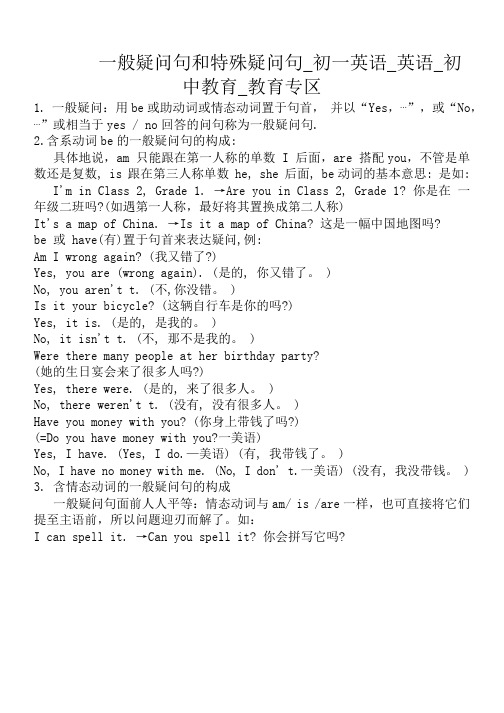
一般疑问句和特殊疑问句_初一英语_英语_初中教育_教育专区1. 一般疑问:用be或助动词或情态动词置于句首,并以“Yes,⋯”,或“No,⋯”或相当于yes / no回答的问句称为一般疑问句.2.含系动词be的一般疑问句的构成:具体地说,am 只能跟在第一人称的单数 I 后面,are 搭配you,不管是单数还是复数, is 跟在第三人称单数 he, she 后面, be动词的基本意思: 是如: I'm in Class 2, Grade 1. →Are you in Class 2, Grade 1? 你是在一年级二班吗?(如遇第一人称,最好将其置换成第二人称)It's a map of China. →Is it a map of China? 这是一幅中国地图吗?be 或 have(有)置于句首来表达疑问,例:Am I wrong again? (我又错了?)Yes, you are (wrong again). (是的, 你又错了。
)No, you aren't t. (不,你没错。
)Is it your bicycle? (这辆自行车是你的吗?)Yes, it is. (是的, 是我的。
)No, it isn't t. (不, 那不是我的。
)Were there many people at her birthday party?(她的生日宴会来了很多人吗?)Yes, there were. (是的, 来了很多人。
)No, there weren't t. (没有, 没有很多人。
)Have you money with you? (你身上带钱了吗?)(=Do you have money with you?一美语)Yes, I have. (Yes, I do.—美语) (有, 我带钱了。
)No, I have no money with me. (No, I don' t.一美语) (没有, 我没带钱。
- 1、下载文档前请自行甄别文档内容的完整性,平台不提供额外的编辑、内容补充、找答案等附加服务。
- 2、"仅部分预览"的文档,不可在线预览部分如存在完整性等问题,可反馈申请退款(可完整预览的文档不适用该条件!)。
- 3、如文档侵犯您的权益,请联系客服反馈,我们会尽快为您处理(人工客服工作时间:9:00-18:30)。
一般疑问句和特殊疑问句集团标准化办公室:[VV986T-J682P28-JP266L8-68PNN]一般疑问句与特殊疑问句Date:_______ name:_______一、【一般疑问句】1. 定义:用be、助动词或情态动词置于句首,并以“Yes,…”,或“No,…”或相当于yes / no回答的问句称为一般疑问句.2. 含系动词be的一般疑问句的构成:Be +主语+其它注意:am 只能跟在第一人称的单数 I 后面;are 搭配 you,不管you是单数还是复数;is 跟在第三人称单数 he, she, it后面Eg: I'm in Class 2, Grade 7.→ Are you in Class 2, Grade 7 (如遇第一人称,最好将其置换成第二人称)It's a map of China.→Is it a map of China这是一幅中国地图吗3. 含实义动词的一般疑问句的构成:Do/Does +主语 + 动词原形 + 其它注意:主语为第三人称单数,谓语动词为一般现在时单数第三人称形式"v-(e)s"时,用does,并要将谓语动词变回原形(如has→have,likes→like等);有时陈述句中的some还要变作any等。
如:Eg: She lives in Beijing. →Does she live in BeijingI like English. →Do you like EnglishThere are some books on my desk.→Are there any books on your desk4. 含情态动词的一般疑问句的构成:情态动词+主语+动词原形+其它Eg: I can spell it. →Can you spell it?I will do that for her. →Will you do that for her?She can drive. →Can she drive5. 一般疑问句的应答动词保持一致。
如:① -Is Mary a Japanese girl? -Yes, she is. / No, she isn't.② -Can Lily speak Chinese- Yes, she can./ No, she can't. / Sorry, I don't know.下面浅谈一下陈述句变一般疑问句的变化规则。
1.句中有"is、 are或can"的句子,把"is、are或can"提到句首,句号变问号。
例如:原句一般疑问句He is Tom.Is he TomThis is a bird. Is this a bird?Lulu can dance.Can Lulu danceThey are playing basketball.Are they playing basketball?2.以"I am…… "和"We are……" 开头的句子,把"I am……"和"We are…… 均变成"Are you……" 句号变问号,其他单词不变。
例如:原句一般疑问句I am a teacher.We are playing basketball.Are you a teacher?Are you playing basketball?3.句中没有"am、is、are和 can"的句子,如果主语是第一人称、第二人称或第三人称复数的句子,句首加"Do",“I 、We”变成“you”,句号变问号,其余单词不变。
例如:原句一般疑问句I like music Do you like music?We have some rulers.Do you have some rulers?They like watching TV.Do they like watching TV?4.句中没有"am、 is、 are" 的句子,如果主语是第三人称单数时,句首加"Does",动词变原型,句号变问号,其他单词不变。
如:原句一般疑问句He likes football.Does he like football?Jim has a ruler Does Jim have a ruler?注:变疑问句后的第一个单词的第一个字母必须大写!二、【特殊疑问句】1. 定义: / 进行发问,回答时针对问句中的代词和副词来回答,不用yes或no的句子叫特殊疑问句。
2. 特殊疑问词全搜索:一句话: wh-开头外加能与之结伴同行的名词; how及它的形容词兄弟姐妹们,即如: what,where,which,what class,what time,what number,who, whom, whose;how,how many,how old,how much等。
无论是做疑问代词还是限定词,which 和 what 所指的范围不同。
what所指的范围是无限的,而which 则指在一定的范围内,例如:Which girls do you like best 你喜欢哪几个姑娘What girls do you like best 你喜欢什么样的姑娘Which do you prefer, coffee or tea 咖啡和茶,你喜欢喝哪种What do you usually drink before dinner 你饭前通常喝什么Whom是who的宾格,在书面语中,它作动词宾语或介词宾语,在口语中作宾语时,可用who代替,但在介词后只能用whom,例如:Who(m) did you meet on the street? 你在街上遇到了谁(作动词宾语)Who(m) are you taking the book to? 你要把这书带给谁(作介词宾语,置句首)3.How old are you你多大了What's this in English这个用英语怎么讲4. 询问天气的方式。
“How +be +the weather...”与“What + be + the weather like...”意思相同。
Eg: How is the weather today = What's the weather like today 今天天气如何【巩固练习】1)①The twins were making a kite when their mother came in. (对划线部分提问)______ _____ the twins _____ when their mother came in②Mrs Turner asked her son to buy some eggs for supper. (对划线部分提问)_______ ______ Mrs Turner ask her son ______ _______ for supper2)对限定名词的定语提出疑问,疑问词应用which,而且必须和名词连用。
I'm going to take the shirt on the right.(对划线部分提问)______ _____ are you going to take3)对指人名词或代词提问用who,作宾语时提问用whom。
4)对物主代词和名词所有格提问用whose。
eg. Li Ping's coat→Whose coat,my father→Whose father5)对具体时间提出疑问,如 in the morning,last Sunday等,疑问词用when;对具体几点钟提问,疑问词应用what time。
6)对具体地点提出疑问,疑问词应用where。
The pupils are having a picnic at the foot of the hill. (对划线部分提问)_____ _____ the pupils having a picnic7)对表原因的从句提问,常见的有because引导的从句,疑问词应用why。
Xiao Cheng didn't go to the farm with us because he was ill. (对划线部分提问)_______ _____ Xiao Cheng go to the farm with us8)对程度或方式等提出疑问,用疑问词How。
eg. I usually go to school by bike.How is that movie I like it very much.9)对数量提出疑问,疑问词为How many,要注意how many必须跟名词的复数形式。
eg. two hundred sheep→How many sheep10)对价格提出疑问,疑问词用How much。
eg. I paid fifty yuan for the sweater.______ ______ did you pay for the sweater11)对时间长度(时间段)提出疑问,疑问词应用How long。
eg. I've worked in that factory for two years. (划线提问)______ _____ _______ you worked in that factory12)对时间频率,如 once a year, twice a week等提问,疑问词用How often。
How often do you visit your grandma?13)对具体次数,如 once, twice, three times等提问,疑问词用How many times。
eg. ----- did he call you the day before yesterday? -----Twice.A. What timeB. How many timesC. How muchD. How long14)对in+一段时间提问,疑问词一般用How soon。
eg. Jane and her brother will finish the work in two hours. (划线提问)_____ _____ _____ Jane and her brother finish the work15)对距离提出疑问,疑问词用How far。
